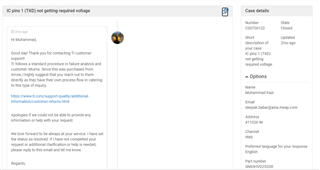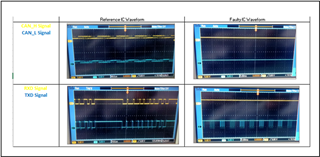Part Number: SN65HVD252
Dear Sir/Madam,
Greeting of day..
We found 1 module faulty due to IC SN65HVD252DR (RMICSE0122SCO) failure at Mitsubishi Electric Pvt. Ltd customer end.
IC pins 1 (TXD) not getting required voltage.
Please find below for more details.
we already raised case to TI portal, but instead of any analysis report case was closed by TI.


since supplier-arrow not having any idea for further processing.
please look into this matter and reopen the case once again.
Thanks & Regards,
Muhammad Kazi
Sr. Quality Engg.
MEI- Pune (India)
MITSUBISHI ELECTRIC INDIA PRIVATE LIMITED
Tel. No.: +91 20 40762112; (Mob. No.): +91 9765639591
Email: URL: www.mitsubishielectric.in


